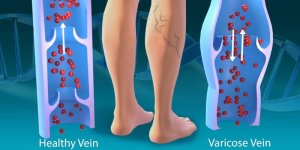Health News

Early-life adversity – such as poverty, illness or family conflict – has long been linked to mental health difficulties and poorer cognitive functioning as children grow up. »

Scientists at the Department of Energy’s Oak Ridge National Laboratory explored the genetic basis of varicose veins. The team identified 139 locations across the human genome tied to risk factors for the disorder that can guide the development of new treatments. »

NIH researchers discover a possible cause for a rare facial malformation, bringing new hope for patients. »

In a mouse study, researchers have identified a potential non-hormonal contraceptive that men could take shortly before sexual activity and have fertility restored the next day. »

Researchers have found differences in the gut microbiomes of people with myalgic encephalomyelitis/chronic fatigue syndrome (ME/CFS) compared to healthy controls. »

Cambridge scientists have successfully trialled an artificial pancreas for use by patients living with type 2 diabetes. »

New technique enables automatic detection of placental compartments, oxygen status and structural abnormalities. »

Synthetic molecules that adhere cells could galvanize regenerative medicine. »

Vaccines that provide long-lasting protection against influenza, coronaviruses and respiratory syncytial virus (RSV) have proved exceptionally difficult to develop. »

A promising approach to control Staphylococcus aureus bacterial colonization in people – using a probiotic instead of antibiotics – was safe and highly effective in a Phase 2 clinical trial. »

Researchers are testing a new way to treat people with allergies. The method uses regular allergy shots plus a lab-made molecule. »

Study links very dry and very humid indoor environments with worse COVID-19 outcome. »

A research team has developed a new approach to better understand the biology of polycystic kidney disease (PKD), an often-life-threatening genetic disorder that affects millions worldwide. »

Moderate levels of two outdoor air pollutants, ozone and fine particulate matter, are associated with non-viral asthma attacks in children and adolescents who live in low-income urban areas, a study has found. »

Cambridge scientists have managed to identify and kill those breast cancer cells that evade standard treatments in a study in mice. The approach is a step towards the development of new treatments to prevent relapse in patients. »

Cambridge scientists have used synthetic biology to create artificial enzymes programmed to target the genetic code of SARS-CoV-2 and destroy the virus, an approach that could be used to develop a new generation of antiviral drugs. »

Researchers at Penn State have successfully 3D bioprinted breast cancer tumors and treated them in a breakthrough study. »

New study uses postmortem brain tissues to understand genomic differences in individuals with attention deficit hyperactivity disorder. »

Water – which makes up the majority of every cell in the body – plays a key role in how proteins, including those associated with Parkinson’s disease, fold, misfold, or clump together, according to a new study. »

People who have a past history of hospitalisation because of substance use disorders have much worse outcomes following the onset of a wide range of physical health conditions, according to researchers in the UK and Czechia. »

Scientists find link between lung tumor growth and disrupted circadian rhythms. »

Lower levels of HDL cholesterol were associated with increased risks for heart attacks in white but not Black adults, and higher levels were not protective for either group. »

An experimental therapeutic cancer vaccine induced two distinct and desirable immune system responses that led to significant tumor regression in mice. »

Scientists incorporate 'noncanonical' pathway to enable cells to make own drugs. »

Researchers develop new tools to demonstrate how environmental agents can lead to diseases. »

Study highlights potential treatment for aggressive lung cancer. »

Cambridge scientists have shown that it may be possible to spot signs of brain impairment in patients as early as nine years before they receive a diagnosis for one of a number of dementia-related diseases. »

Role of insulin and an insulin-suppressing protein shed light on why queens live longer than workers. »

Research method integrates human cortical organoids into developing rat brains, allowing for study of brain processes associated with disease. »

An experimental approach to enhancing a standard cat allergy treatment made it more effective and faster acting, and the benefits persisted for a year after treatment ended. »

Scientists have shown that in one in every 4,000 births, some of the genetic code from our mitochondria – the ‘batteries’ that power our cells – inserts itself into our DNA, revealing a surprising new insight into how humans evolve. »

The bacteria that reside in the human gut, or the gut microbiome, are transmitted to offspring through the milk of nursing mothers. »

Simple nasal washes with mild saline water can prevent hospitalisation and deaths from COVID-19, if applied twice daily following a positive diagnosis. »

Next-generation technology maintains blood glucose levels by automatically delivering insulin. »

A dollop of margarine or spread can go a long way to livening up a slice of toast, a piping hot ear of corn or other food. »

Adults who cut back on sleep for six weeks had increased markers of inflammation. »

New research explores how the brain responds to music and speech during sleep. »

Study suggests technique may be more effective than standard treatment. »

A prospective study of half a million tea drinkers in the United Kingdom has shown that higher tea intake was associated with a modestly lowered risk of death. »

The Age-Related Eye Disease Studies established that dietary supplements can slow progression of age-related macular degeneration. »

Practicing yogic breathing may have an effect on an individual’s cerebrospinal fluid (CSF) dynamics—the movement, flow, and circulation of the CSF—and on the health of the central nervous system, according to a new study. »

Weather plays key role in the spread of mosquito-borne diseases. »

America's fondness for peanuts accounts for 65 percent of all U.S. nut consumption. Per person, that equates to nearly 8 pounds of goobers annually. »

Researchers studying mice have found the first evidence of how a mother’s gut microbes can help in the development of the placenta, and the healthy growth of the baby. »

Origins lie in precursor to modern-day corn that grows wild in the highlands of Mexico. »

Loss of the protein pigment epithelium-derived factor (PEDF), which protects retinal support cells, may drive age-related changes in the retina. »

Findings could be a step toward more effective treatments. »

Breakthrough technology promotes healthy tissue regrowth. »

Study of pregnant women confirms link with chemicals that could put pregnancy at risk. »

Newly identified brain circuits may point to more effective pain therapies. »
